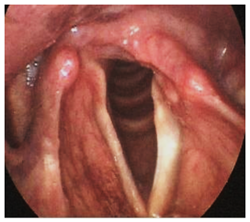 Vocal fold paresis and paralysis are disorders characterized by either reduced mobility or complete immobility of the vocal folds, respectively. The nerve that controls the closing or opening of the vocal folds is affected.
Vocal fold paresis and paralysis are disorders characterized by either reduced mobility or complete immobility of the vocal folds, respectively. The nerve that controls the closing or opening of the vocal folds is affected. Vocal Cord Paralysis and Vocal Cord Paresis Causes
Causes of vocal fold paresis or paralysis may include physical injury to the nerve (ie surgical trauma), growths/tumors along the course of the nerve, side effects from radiation therapy, cardiovascular causes, possible viral infections, neurologic conditions, or idiopathic (unknown) origins.Symptoms of Vocal Cord Paralysis/Paresis
Symptoms of vocal fold paresis or paralysis are highly variable depending on the severity of the vocal fold motion disorder and how well the vocal folds are able to close during voicing. For example, some patients with vocal fold paresis may have more subtle voice complaints such as mild hoarseness, reduced loudness, or vocal fatigue. Some patients with vocal fold paralysis may experience similar symptoms to a greater degree, along with other voice changes such as a weak, breathy voice and shortness of breath when speaking.Diagnosis of Vocal Cord Paralysis/Paresis
Our voice care team at the Voice and Swallowing Center has the advanced training and skills necessary to diagnose this voice condition. During the initial visit, you will be assessed by one of our laryngologists and likely, an additional session with one of our voice pathologists. We use cutting-edge diagnostic tests to determine the cause of your voice disorder and to develop your plan of care. Following a thorough discussion of your symptoms and medical history, be expected to undergo the following assessments:
- Video Laryngostroboscopy: Using a small camera inserted through the nose, our specialists are able to assess the health and function of your larynx (voice box), and determine the presence of any abnormalities in vocal fold mobility. Click the link to learn more.
- Perceptual, Acoustic, and Aerodynamic Voice Evaluation: This is a comprehensive assessment of multiple voice parameters completed by the voice pathologist. Click the link to learn more.
Your laryngologist may also recommend an imaging study (such as a CT of the chest and neck) to help in determining the cause of your voice disorder.
Vocal Cord Paralysis or Paresis Non-Surgical Treatment
Treatment for vocal fold paresis or paralysis varies depending on the prognosis for recovering vocal fold motion and the severity of the patient’s symptoms/how the voice changes impact activities of daily living. In some cases, patients prefer a “wait and see” approach, waiting to see if vocal fold motion recovers spontaneously. In some cases, the vocal fold mobility impairment may cause mild symptoms and you may be recommended for observation only.
If your voice condition affects your activities of daily living and quality of life, you may be evaluated by one of our voice pathologists to determine your candidacy for voice therapy. In some cases of vocal fold paresis or paralysis (particularly in less severe cases), voice therapy with special attention to efficient and healthy voice use may resolve or significantly reduce voice symptoms. In other cases, voice therapy may need to be combined with surgical treatment (i.e. before surgery, after surgery, or both).
Vocal Cord Paralysis or Paresis Surgical Treatment
In cases of vocal fold paresis and paralysis which do not respond to voice therapy, surgical intervention is offered. Surgery options primarily consist of medialization procedures that attempt to “push” the affected vocal fold to a more favorable position (ie in the middle of the body). We offer laryngeal framework surgery, which includes placement of a vocal fold implant, in-office vocal fold injection augmentation, which involves injecting a temporary filler into the vocal fold(s), or vocal fold fat injection augmentation, an injection of your own fat into the vocal fold(s). Your laryngologist with help you choose the best procedure for you as each option has its own advantages and disadvantages. These procedures often significantly improve the voice, and in some cases, voice therapy may also be recommended post-operatively.
